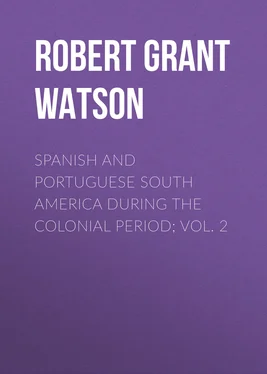Robert Grant Watson - Spanish and Portuguese South America during the Colonial Period; Vol. 2
Здесь есть возможность читать онлайн «Robert Grant Watson - Spanish and Portuguese South America during the Colonial Period; Vol. 2» — ознакомительный отрывок электронной книги совершенно бесплатно, а после прочтения отрывка купить полную версию. В некоторых случаях можно слушать аудио, скачать через торрент в формате fb2 и присутствует краткое содержание. Жанр: foreign_prose, История, foreign_edu, foreign_antique, на английском языке. Описание произведения, (предисловие) а так же отзывы посетителей доступны на портале библиотеки ЛибКат.
- Название:Spanish and Portuguese South America during the Colonial Period; Vol. 2
- Автор:
- Жанр:
- Год:неизвестен
- ISBN:нет данных
- Рейтинг книги:3 / 5. Голосов: 1
-
Избранное:Добавить в избранное
- Отзывы:
-
Ваша оценка:
- 60
- 1
- 2
- 3
- 4
- 5
Spanish and Portuguese South America during the Colonial Period; Vol. 2: краткое содержание, описание и аннотация
Предлагаем к чтению аннотацию, описание, краткое содержание или предисловие (зависит от того, что написал сам автор книги «Spanish and Portuguese South America during the Colonial Period; Vol. 2»). Если вы не нашли необходимую информацию о книге — напишите в комментариях, мы постараемся отыскать её.
Spanish and Portuguese South America during the Colonial Period; Vol. 2 — читать онлайн ознакомительный отрывок
Ниже представлен текст книги, разбитый по страницам. Система сохранения места последней прочитанной страницы, позволяет с удобством читать онлайн бесплатно книгу «Spanish and Portuguese South America during the Colonial Period; Vol. 2», без необходимости каждый раз заново искать на чём Вы остановились. Поставьте закладку, и сможете в любой момент перейти на страницу, на которой закончили чтение.
Интервал:
Закладка:
In the meantime Nassau was not idle in Brazil . The province of Ceará fell into his hands; and he himself made a journey through the captaincies of Paraïba and Potengi , with the object of putting such places as had suffered into due repair. He now received intelligence from Lisbon that another large fleet was being equipped for Brazil , and he took the precaution of soliciting reinforcements from the West India Company. On his return from Paraïba , although he had only received an addition of two hundred troops, he resolved to undertake an expedition against San Salvador . The people of Bahia were far from expecting any such attack, but, fortunately for them, Bagnuolo, who had been made wary by disasters, took precautions for them. By means of spies he was made aware of the movements of Nassau, and took up his quarters at Villa Velha , close to San Salvador . The chief of the Portuguese intelligence-department—the active Souto, who had betrayed Calabar—was despatched to Pernambuco to gain more precise information. He was not long in obtaining it; for, after having gallantly attacked a Dutch force superior in numbers to his own, a letter fell into his hands detailing the intentions of Nassau.
1638.
The people of Bahia were now awake to their danger; and, after a hurried preparation of five days, the Dutch appeared off the bay. Having landed in the afternoon at Tapagipe , they advanced on the following morning against the city, which was defended by a garrison of fifteen hundred men, in addition to a thousand or more from Pernambuco . The first day the forces on either side faced each other in the open without advancing to the attack; but, as these prudent tactics on the part of their defenders did not suit the taste of the townspeople, Bagnuolo on the following morning marched out to give the Dutch battle. The enemy had, however, altered their position, and he had nothing better to do than to return.
Nassau now commenced to attack the forts and to take possession of the heights around the city; and the Portuguese in their hour of danger had the good sense to concentrate the military command in one person, Bagnuolo, whose zeal and activity at this critical moment justified the confidence reposed in him. An attack made on the trenches of San Antonio by fifteen hundred Dutch was repulsed with the loss of two hundred. The Dutch general was thwarted in his efforts, mainly through want of local knowledge respecting the country in which these operations took place. The intelligence-department of the Portuguese, on the other hand, was admirably served, and the besieged were amply provided with provisions, whilst there was a scarcity in the Dutch camp.
On the 1st of May the Dutch batteries were opened; but as fast as the walls of the town disappeared before them, fresh works arose within. Days and weeks went on, and Nassau began to experience much inconvenience from the scarcity of provisions, an evil which his foraging-parties were unable to remedy. He now resolved to carry the trenches by storm, and on the evening of the 18th three thousand men were ordered to the assault. The ditch was easily won; but a fierce fight took place at the gate. All the forces were brought up to this spot on either side. At length the Dutch gave way, notwithstanding all the efforts of their general, and when darkness came on the knowledge of the locality which the Portuguese possessed gave them a still further advantage. Next morning Nassau asked for a truce for the purpose of burying the dead. The Dutch had lost five hundred men slain, whilst fifty others were made prisoners. The loss on the side of the Portuguese was less than half the above number, but it included the indefatigable Souto. For another week the besiegers continued a useless fire upon the city, at the end of which time they abandoned their enterprise, having suffered much from sickness during the six weeks’ siege. The Dutch returned their prisoners, leaving sixty of their own, but they carried away with them four hundred negroes.
Notwithstanding his repulse, Count Nassau did not abandon the hope of taking San Salvador at a more convenient season, and with this object he now reiterated his request to the Company for reinforcements. That body, after much deliberation, now resolved to throw open the trade with Brazil , which had hitherto been their monopoly. Nassau, whose opinion was asked, gave his advice in favour of this measure. He urged that the only hope of creating a successful colony was by offering inducements to Dutchmen to emigrate to Brazil , and that, were the trade not thrown open, such inducements could not exist. His word carried the day; and the monopoly of the Company was for the future confined to the traffic in slaves, in implements of war, and in Brazilian woods.
The remembrance of the capture of the Mexican fleet by Heyne now induced the Company to send out a large squadron, under the experienced Jol, to attempt a similar feat. The old captain set out from Recife in great hopes, which were, however, doomed soon to disappointment. He indeed met the Mexican fleet, which he resolutely engaged; but his captains did not support him, and so the Spaniards escaped. This futile attempt, by drawing away men at a moment when Nassau was sorely in want of succours, was the cause of much embarrassment to that general in the execution of his plans. Early in the following year [1639], Artisjoski brought out a small reinforcement; but he himself soon returned to Holland, after having brought some absurd charges against Count Nassau, which were at once refuted.
At this period the West India Company were in possession of six provinces in Brazil , extending from Seregipe in the south to Ceará in the north. Of these the first had been laid waste, whilst their hold on the last-named was confined to one small fort. Nevertheless the natives were friendly allies of the Dutch. The important captaincy of Pernambuco contained five towns, namely— Garassú , Olinda , Recife , Bella Pojuca , and Serinhaem ; it likewise possessed several considerable villages. Previously to the Dutch invasion there had been one hundred and twenty-one sugar-works, of which thirty-four were now deserted. In Itamaraca fourteen works still survived, of three-and-twenty which had existed before the conquest. Paraïba still possessed eighteen works out of twenty; whilst Rio Grande had one out of two. In the whole Dutch dominion one hundred and twenty survived. The tenths of their produce were leased—in Pernambuco for 148,500 florins ; in Itamaraca and Gojana for 19,000; and in Paraïba for 54,000. With other items, the whole tenths amounted to 280,900 florins .
Whilst the country had suffered severely from the Dutch invasion, the city of Recife , being the seat of government and of commerce, had thriven. Colonists were greatly wanted; more especially there was a constant demand for skilled labour,—three, four, and six florins a day being given as wages to builders and carpenters. The Portuguese inhabitants of these provinces were held in subjection only by fear, with the exception of the Jews, who were excellent subjects. With the native Brazilians the Dutch had considerable trouble; whilst negroes were more scarce, and consequently more dear than before, some having followed their Portuguese masters in their emigration, and others having joined the black community at the Palmares . The military force of the Dutch amounted to rather more than six thousand men, and they reckoned on a thousand native auxiliaries; but all this force was required for garrisons. On the whole, the colony could scarcely be pronounced flourishing. Without supplies from Holland it could hardly furnish its own food, since so many cultivators had been driven away. All possessors of land were compelled under heavy penalties to devote a certain portion of it to the cultivation of mandioc.
Читать дальшеИнтервал:
Закладка:
Похожие книги на «Spanish and Portuguese South America during the Colonial Period; Vol. 2»
Представляем Вашему вниманию похожие книги на «Spanish and Portuguese South America during the Colonial Period; Vol. 2» списком для выбора. Мы отобрали схожую по названию и смыслу литературу в надежде предоставить читателям больше вариантов отыскать новые, интересные, ещё непрочитанные произведения.
Обсуждение, отзывы о книге «Spanish and Portuguese South America during the Colonial Period; Vol. 2» и просто собственные мнения читателей. Оставьте ваши комментарии, напишите, что Вы думаете о произведении, его смысле или главных героях. Укажите что конкретно понравилось, а что нет, и почему Вы так считаете.












